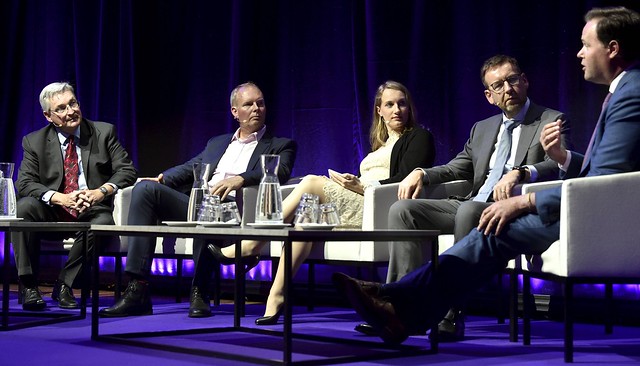Philips Ripley Martin joins global leaders to discuss healthy aging through 2030
The first ever Silver Economy Forum, organized by the Global Coalition on Aging (GCOA) and the Finnish Government recently took place in Helsinki, Finland, attended by hundreds of government officials, business leaders, policy-makers and technology innovators worldwide.
During day one of the event, Ripley Martin, General Manager of Aging and Caregiving at Philips, participated in a panel discussion moderated by Dave Ryan, General Manager, Health & Life Sciences Business, at Intel Corporation, which also included thought leaders across health technology including Kalle Killar, Deputy Secretary General of E-services and Innovation Ministry of Social Affairs in Estonia; Mike Devoy, Chief Medical Officer of Bayer and Sara Härmälä, Director, Upgraded – Health Startup Association.
The discussion looked at the scalability of healthcare technology solutions, the significance of partnerships (and pilot programs), and a shift from a ‘diagnosis to prevention’ mindset, with the goal of helping seniors stay out of healthcare settings for longer and live healthier and more fulfilled lives. With connected care and virtual solutions to proactively manage their wellbeing from home, the data from seniors, family caregivers and other care partners informs and better equips care providers to orchestrate appropriate and timely care to manage this growing aging population.
“The impact and implications of an increasingly aging population are no longer limited to a single country or region,” said Martin. “It’s a truly global issue. And while there are certainly local nuances, it was clear from the Silver Economy Forum held in July in Helsinki, Finland, that catering for an aging workforce in particular, is moving up the global business agenda.”
With the inevitability of growing older, the forum challenged leaders to rethink how to manage the aging society, moving beyond the notion that the aging population imposes a burden on society, to recognizing the opportunity for economic growth. Not only does the aging population want to contribute to society – whether it’s working with local communities or becoming caregivers for those less able – they also want to be healthy and active. They want to be included and given a place – and a voice – both in society and in their aging journey.
Once a binary theme, retirement now embodies a mindset shift. Today, many older adults in classical retirement work under new terms, finding ways to give back to the community and fill their time. This cohort is demanding greater flexibility when it comes to their roles, their work hours and the actual time spent in the office, but businesses should be careful not to offer initiatives that focus purely on their age. It’s about shifting mindsets from treating the aging population as “just seniors,” and recognizing the unique individual skills and experience they bring to the workforce. As strong economic drivers, the aging workforce is steepening the labor pool competition, redefining workforce demographics and reimagining the future of work.
The panel session discussion can be viewed in its entirety here.
For more information on the Philips integrated suite of Aging and Caregiving solutions, visit: https://lifeline.philips.com.
Ripley Martin is the General Manager of Aging and Caregiving within Population Health Management at Philips, where he leads Philips’ Lifeline product suite of personal emergency response services and solutions, medication management solutions and health solutions to ease and enrich the aging journey for seniors and their caregivers.
Source: Philips
 Global Coalition On
Global Coalition On 